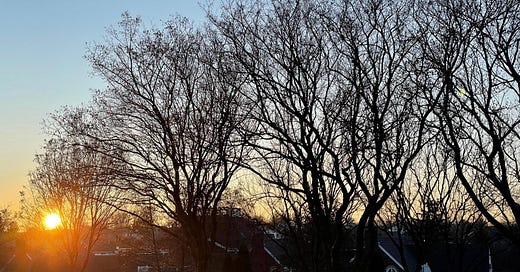I first read Fati’s poems in the Fall of 2024 when I learnt that she was an incoming Stegner Fellow for Poetry. I immediately fell in love with her poetry. Allow me to ask you all—respectfully—to also fall in love with it.
Coin
To speak of this would be to speak of
a cave, the utterance of a unlettered mouth.
The moon floats like a coin in black water.
The candle on the table is dead.
A throat hangs forlorn like a
well. A year hangs forlorn like a well.
But still, a glint in the dark—
a fish’s tail. Silver whisper, silvered
whisp. God is closer to me
than my jugular vein. The hummingbird winds up.
Drinks syrup from a velvet plate.
A nub of honey begins to spin in its throat.
Inevitable life stirs, like a cracked
seed, its green shoot, ringing off the walls
its song. Every day I tried to say it—
my family, when I saw your faces
in the good sun
I died once, then
many times, again and again
Coin by Fatima Jafar was first published by The Drift.Here is Fatima’s reading of her poem:
Translation
Translation—for me—is just another exercise in deep engagement with a piece of work. When I love a work so much, all I want to do is to sit with it longer, to try to make it a part of myself, to share it with beloveds.
Substack is not equipped to handle Nastaliq right now, so I am going to try paste a screenshot of the translation here instead. For my Urdu-understanding but not reading beloveds, you can also find an audio of me reading the translation below.
Here is the version you can listen to in my voice:
(excuse the traffic noises in the background; these are the perils of living in a city on a chaand raat (not that I’d be anywhere else)).
Notes on Translation
I wanted to maintain the form of the piece, so each monostich and couplet appears—largely—as in the original.
“Silver whisper, silvered whisp” has both repetition and alliteration. I try to achieve a similar effect with the repetition of “chaandi” (silver) and “rang” (color).
Family is literally “khandaan” in Urdu—but that sounded awkward. I thought of “family” as superseding species in this poem, inculcating all kinds of birds, animals, and objects. Everything alive in the world the poet finds herself pulled by.
“Hum-nafas,” literally “those who breathe together” or “those who breathe the same,” came closest to that feeling. Hum-nafas is also used to address a beloved or a friend in Urdu and Persian.
Fati’s original phrase of “good sun” is chef’s kiss but translating it literally in Urdu as “acha suraj” felt awkward and clunky. Instead, this is where I relied on meaning more than the word itself: what does a good sun feel like?
And those of us from this side of the world know that a good sun is one that is just setting, when its heat does not feel like our skins are boiling. A setting sun is gentle, even beautiful. It is promising that life could be good.
Thus, I translated it as “maddham suraj” or “the dull sun.” (Also a nod to one of my favorite songs ever.)
You can follow Fati’s work here: fatimajafar.com
As always, I am very eager to know your thoughts on this.
P.S Eid Mubarak to all those celebrating!
In solidarity,
Javeria






Even though I dont understand urdu, I enjoy hearing your reading so much! Love the notes on the translation. Thank you for sharing love.
The translation helped me sit with the English in a more intentional way the second time I read it - thanks so much for this!